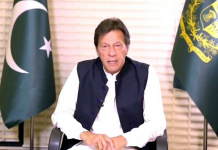ISLAMABAD, Aug 8 (APP):Prime Minister Shehbaz Sharif on Tuesday launched a Rs 377 billion “revolutionary” project to solarise 100,000 agricultural tube-wells across the country, which, he said, was inevitable and the only way forward to make the country progress.
“This is a revolutionary step as without it, no one can think of Pakistan making progress… I want to give a message that no other project can match the significance of solar energy,” the prime minister said addressing the launching ceremony here which marked the distribution of solar tube- well certificates to Islamabad-based-farmers.
Calling agriculture the only sector to turn around the national economy, he said the provision of low-cost power supply was inevitable to not only for the farmers but also the households, shopkeepers and industry to make the exports competitive.
Lamenting the previous government’s negligence for not exploiting the immense resources of hydel and solar energy, he said the provision of low cost electricity was the foremost obligation of every government.
He said during last 16 months, his government made utmost efforts to launch the project but the political situation and uncertainty about the IMF agreement caused the delay.
Explaining the scenario of a default country, the prime minister exemplified Sri Lanka and said such states had to curtail imports to save foreign exchange which ultimately led to severe shortage of life-saving drugs, petrol and other commodities, crisis of imported materials and closure of industry, thus leading to chaos.
He said as the International Monetary Fund (IMF) had disallowed the subsidy to the agriculture and industrial sectors, the solar energy was the only way forward for cost-reduction and lessen dependence on the costly imported oil.
Prime Minister Shehbaz said on completion of the incumbent government’s term, he would send a summary to the President of Pakistan for dissolution of the National Assembly by Wednesday.
Therefore, he gave a message to the next government that the solarisation project was of the utmost importance as the foundation of Rs 377 billion initiative of tube-wells solariation had been laid, he added.
The prime minister told the gathering that under the mechanism, the Federal Government, provincial government and the farmers would bear one-third each of the total cost of tube-wells solarisation. In case of Islamabad, the government would pay 67% and rest by the farmers.
Referring to his earlier meeting with a Saudi delegation, PM Shehbaz said he had invited Saudi firms to invest in the Diamer Bhasha Dam project which would need around $15 billion investment to build a reservoir and generate power of 4,000MW of electricity.
He said in his tenure, former prime minister Nawaz Sharif had allocated Rs 100 billion for the project but it could not move forward due to the respective government’s negligence.
Prime Minister Shehbaz said for the first time, Thar coal was being utilised under a CPEC project and around 2500MW of electricity was being generated.
He said if his party was given a chance in next elections, he would prove his commitment to rid the country of poverty and loans to make it self-sufficient and a great nation.
In his address, Minister for National Food Security Tariq Bashir Cheema said due to the inflation, the farmers remained deprived of due relief, though the incumbent government strived to meet their needs despite financial constraints.
He said under the project, around 42 tube-wells in Islamabad would be solarised.
He appreciated the prime minister for supporting the farmers of the flood-hit regions which enabled them to restart their farming.
He said consequent to the government’s support and efforts, the country got around 29 metric tons of wheat crop was produced, and expecting around 12.5 billion cotton bales, though the availability of oil seeds increased in the market.
He said the scheme of tube-wells solarisation would prove to be a great milestone to save the farmers from huge power bills.














